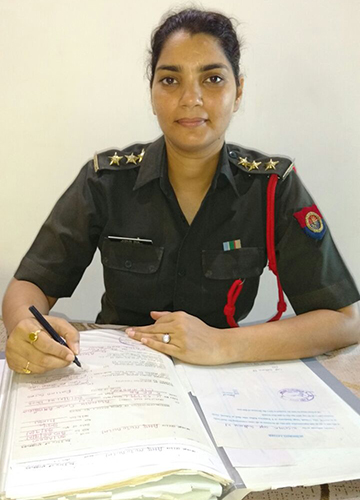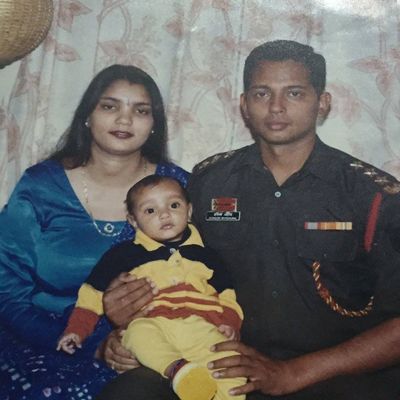Shalini Singh was married at 18 and widowed at 23. The death of her husband, Major Avinash Bhaduria, drove her to the point of considering sati. But, she recovered and made a successful career for herself in the military and then in the corporate world.
Hailing from a middle-class, Rajput family settled in Kanpur, Uttar Pradesh, but with roots in Varanasi, Shalini grew up as an introvert. While she was in the first year of her bachelor’s degree, a marriage proposal came from an Army family. She wanted to graduate, but her family insisted that she meet Avinash. She agreed to marry him after he assured her that he, too, wanted her to study.
The young couple’s first posting was in Jamnagar, near the Pakistan border in Gujarat. Their son, Dhruv, was born two years later. About three-and-a-half years into the marriage, Avinash’s parent unit—the 18 Madras Regiment—was posted to Doda, Jammu and Kashmir, with 8 Rashtriya Rifles, an elite counterinsurgency unit of the Army. Shalini and Dhruv moved back to Avinash’s home in Kanpur. “He used to write a letter to me every day, and I was not fast in replying,” she said, adding that Avinash used to call once in a week or 10 days.
During his nearly one and a half years with the Rashtriya Rifles, Avinash came home only once. He planned to visit again on October 5, 2001; his leave was approved. But, on September 28, he died fighting terrorists in Doda. He was 29. Avinash killed four terrorists before succumbing to bullet wounds. Inspired by his leadership and sacrifice, his men eliminated the remaining terrorists.
Avinash’s family got the call at around 11:30am on September 28. But, Shalini was not told. Though there was news coverage and whispered condolences from visitors, she was shielded from it all. “I was only told that Avinash was injured and recovering at a hospital in Lucknow,” said Shalini. “I was finally told when we were barely a few kilometres from Lucknow. Soon, I was standing in front of a coffin wrapped in the tricolour.”
She got Avinash’s last letter—dated September 27—after his cremation. He wrote it hours before setting out for his last operation. For a moment, the letter made Shalini believe that her husband was alive. “He wrote that he will be moving to base camp,” she said. “‘Let us see whether I reach Kanpur first or the letter’, he wrote. We received his body first; the letter came two days after his cremation.”
Avinash was an athlete—a champion in shot-put and boxing. Keeping in mind his training profile at the National Defence Academy, his first posting was at Hatigarh, a Naxalite-affected area in Assam. While remembering Avinash as a brave officer, Shalini believes that she was the opposite. Having been shielded by orthodoxy all her life (she had never stepped out alone) she was suddenly alone with a child to take care of.
“I went into a state of despair, feeling that I would not be able to live my life,” she said. “I even thought of ending my life.” Her only hope was Dhruv. Once after seeing him lying on her lap, giggling, oblivious to the tragedy, she realised that she could not be weak. She told her husband’s colleagues that she and her son did not want pity and was surprised to be told about the opportunity to join the Army. “I was physically weak and an introvert,” she said. Her parents supported to the hilt, but were not sure about her ability to get in.
Three months after she lost Avinash, she appeared before the Services Selection Board, Allahabad. She made the cut and exactly six months after Avinash’s death, she joined the Officers Training Academy, Chennai.
She left Dhruv with her parents. Every night, she used to cry because she missed him and her parents sent her his photo every week. “When Dhruv joined school, I was not there,” she said. “But, I was doing everything for him; to give him a good upbringing. My husband would have done the same.” Dhruv is now completing his bachelor’s in engineering.
Also read
- THE WEEK celebrates 'Veer Naris' who followed martyred loved ones into the military
- First lady
- Looking back with pride
- Captain Neeta Deswal joined the Army within six months of her husband’s martyrdom
- Sushmita Pandey’s biggest tribute to late husband was joining his Army regiment
- The teacher who joined the Navy at 41 to preserve husband's legacy
The training was difficult. “My fellow cadets were more prepared for Army life, whereas I was enjoying a comfortable life as an Army wife,” she said. “Moreover, I had delivered a baby through a C-section and my body had not recovered completely. But, I had to fight back against life, for us, for Avinash. So, I managed it. Now, I miss my academy days.”
On September 7, 2002, just 21 days short of Avinash’s first death anniversary, Shalini was commissioned into the Indian Army. She was assigned to the Ordnance Corps and posted to Barmer, close to the Pakistan border in Rajasthan, as part of Operation Parakram—the Army’s mobilisation in response to the attack on the Parliament in December 2001. “I had just got out of the academy and the situation on the border was almost war-like,” she said. “I got hardly any time to learn.” She added that while it was demanding and challenging, the experience helped her become more disciplined.
In October 2002, she went to Delhi to receive the Kirti Chakra on behalf of her husband. “Walking up to the stage in my uniform to receive my husband’s Kirti Chakra from former president A.P.J. Abdul Kalam was the proudest moment of my life and the biggest tribute I could have paid him,” she said. Shalini served till 2008 in multiple locations close to the border. After her stint in the Army, she completed her MBA and worked in a leadership position in a multinational corporation.
In 2017, she won a pageant called Classic Mrs India-Queen of Substance. “The gates of the NDA are now open for women, along with permanent commission for women officers,” she said. “But, I would say, women should never use their gender to attain an advantage. Prove yourself through your work and dedication.”



